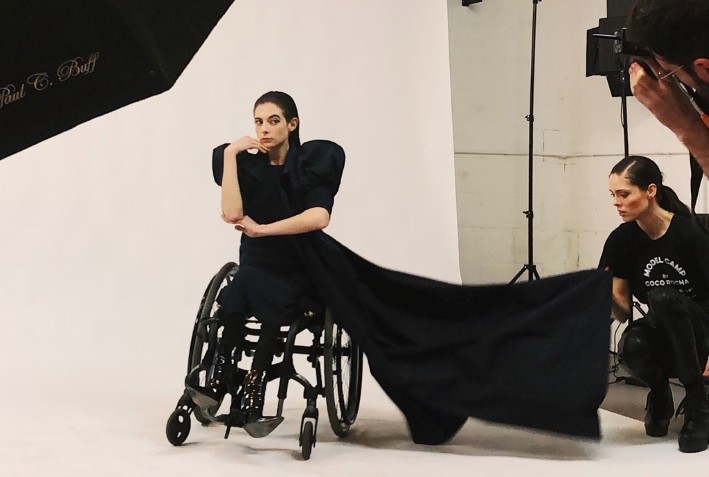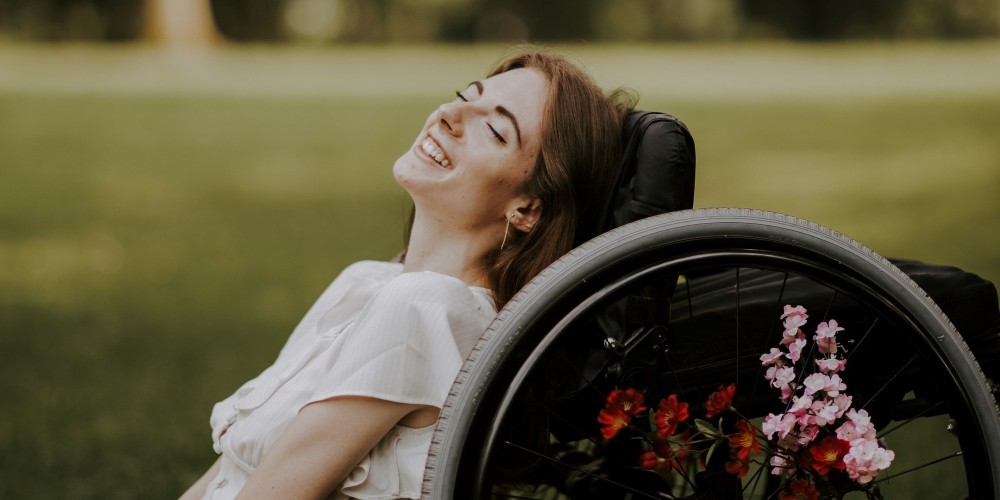Writers in Collaboration: A Model Writer
Writers in Collaboration is a series covering writers involved in two art mediums and/or working with other artists. This week we sat down with recent nonfiction alumna Brianna Sophia Scalesse ’20 whose literary background has helped deepen her imagination and work as a fashion model.
It was her first runway show. As Coldplay‘s Fly On tuned up and designer Don O’Neill gave her the cue, alumna Brianna Sophia Scalesse ’20 entered the spotlight at the most recent New York Bridal Show in a microbead-studded cutaway dress, a tuft of red roses in her hair. She faced an audience of editors and fashionistas, a moment she described as transcendent, a moment that embodied a desire she had carried with her ever since adolescence when she gazed longingly at the TV and dreamed of becoming a model. It was also a moment that reverberated with another one nearly nineteen years before when a head-on car collision took the life of her mother and snapped her spinal cord, leaving her needing a wheelchair.
“That first time on a runway was such an amazing experience, because, I thought, ‘I belong here. I’m supposed to be here and have all eyes on me.’ Their eyes were falling on all of me, the clothes, the hair, the makeup, not just on the wheelchair. Having all eyes on me for a positive reason,” Scalesse described over FaceTime in May, a couple of weeks before she would graduate, remotely, from the Writing program in Creative Nonfiction. She’s working on a memoir and essays.
“I’m so used to having eyes on me even when I go down the street. People are constantly noticing that I am in a chair and that is the first thing their eyes are drawn to versus being on a runway where people’s eyes are on every part of me. I wasn’t being ogled at for all the wrong reasons; I felt beautiful.”
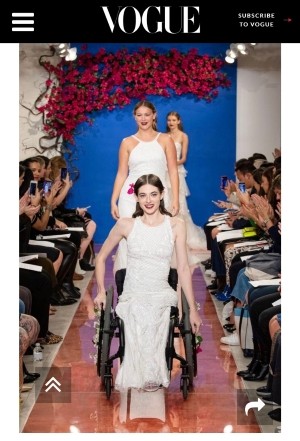
Raised by her maternal grandmother who Scalesse deems “incredibly strong” and also sustained by a close relationship with her half-sister, who would become a nurse on the front lines of the COVID-19 crisis, Scalesse had all the emotional support and role models for resilience. Even so, throughout her schooling in Norwich, Connecticut she was the only one with a disability. Nowhere in the cultural landscape did she see someone like herself as the focus of sexuality and beauty—though one in five people live with a disability, a billion people worldwide.
On stage, Scalesse appeared utterly poised; she vamped and posed projecting emotion in her upper body in the way she was taught to prep for the runway as if she were an actress preparing for a role. She actually stole the show, according to designer O'Neill who called her a “radiant pure light,” as reported by The Today Show. As O’Neill watched her go down the runway ramp, he broke into tears backstage. He, too, was fulfilling a deep promise. He had dedicated his show to Freida Kahlo and a dear friend, Julie Helen, who was diagnosed with cerebral palsy at 18 months and had encouraged him to help make the industry more inclusive.
Although Scalesse made it seem effortless and natural, it was a moment she’d been working toward for years, and only reached through persistence and emotional reckoning. “For me, coming to Columbia was also coming to New York City,” Scalesse said, which meant being one step closer to the fashion world. “I really did want to pursue modeling... I never… I didn’t see a formula for doing so. Even for able-bodied models it’s kind of just luck who gets in.” Scalesse had no credentials, had done nothing except test shoots with photographers. It was near impossible odds.
Scalesse began to really push herself to fight those odds a year after she started the Writing program at Columbia. Although she was motivated, it was challenging. There is a long road between longing and success. What was the catalyst? I asked her. Did the process of writing her memoir and confronting what happened to her change her? “It definitely helped me grow,” she agreed. But, no, the impetus was a lot more visceral than that. In her second semester, Scalesse experienced major health problems that forced her to drop out of school two weeks in. Once again, she was confronting her own mortality, and it was teaching her.
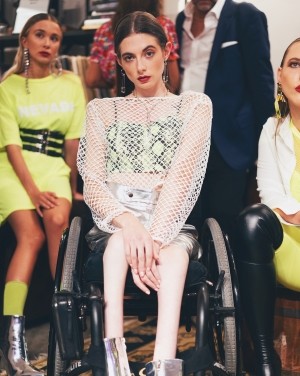
“The experience with my health made me see myself and my body in a different way. And I realized that I really had to pursue my dreams because...” Here she paused for a moment, her voice deepening to that timbre where you know sound and words are touching a deep emotion. “Well,” she said with characteristic succinctness, “tomorrow isn’t promised.”
She carefully curated an Instagram presence and with persistence, she finally broke through the wall of indifference and anonymity. “Every opportunity I’ve had in modeling I’ve gotten through Instagram,” Scalesse said. She used the platform as a portfolio that helped her land her first job through Ffora, a disabilities-focused accessories company that makes bags and cup holders that are, in Scalesse’s words, “almost like a piece of jewelry.”
“My first job I met so many amazing models. That’s where I met Jillian Mercado, the vibrant Dominican model who is in a wheelchair because of cerebral palsy, a model named Khrystyana who was runner up on America’s Next Top Model two years ago. Just through building my connections I ended up getting more and more jobs.”
Scalesse’s name and image began circulating until she came to the attention of casting scouts for the long-running TV series Project Runway in February 2020. They called and said they needed her on set right away for six days. Six days! “It all happened so fast, within one week. I was really overwhelmed because we were also in the middle of the school year.”
Shooting was scheduled in a Brooklyn studio starting at six every morning. “I was the only model with a disability on set at first. I was super nervous,” Scalesse said. “Of course, there are all these stereotypes of models being super catty, but they gave me a lot of advice about how to act natural and to not pay attention to the cameras being there. Thank goodness for them because they don’t give you too much direction… They want it to be natural so they don’t want to coach too much. You just go in, meet the designer, have a conversation. But I was nervous—I’m not used to having 10 cameras on me.”
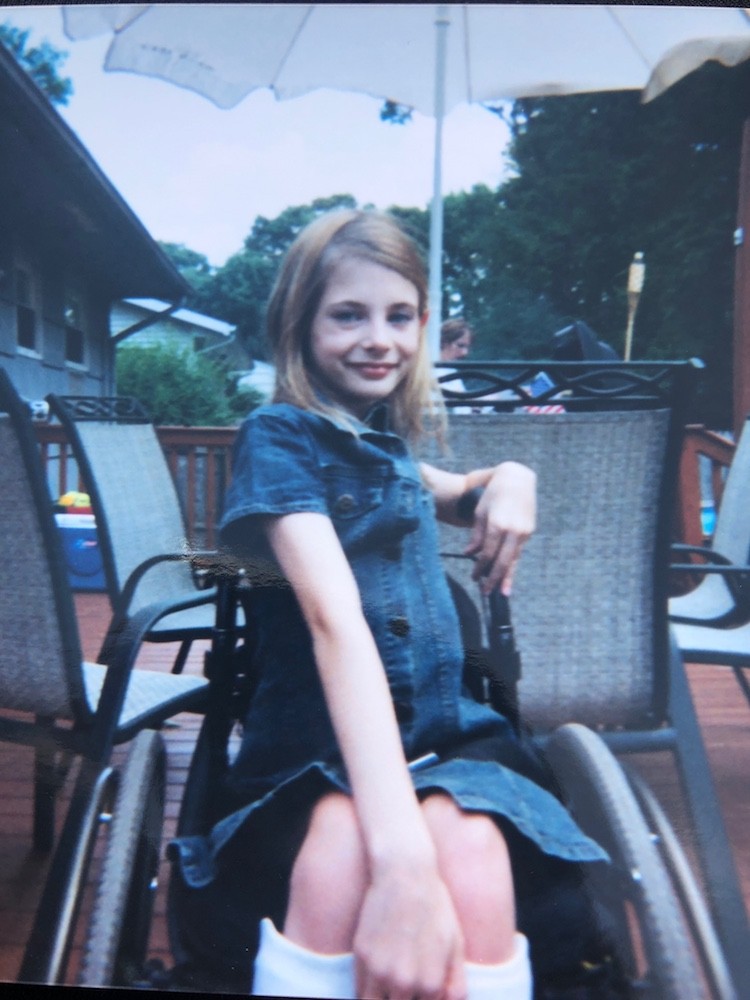
The designer, Nancy Volpe-Beringer put Velcro on everything for ease, no skirt in the back so that as a chair user Scalesse wouldn’t have to worry about her skirt getting caught in the wheels. At 65 years old, Volpe-Berringer was the oldest participant in the show’s history to make it to the finals, and she stayed true to her credo of being inclusive; the finale of the show featured, along with Scalesse, a transgender model, a nonbinary model, and a model who had an amputated leg and wore a prosthetic of Swarovski crystal.
“She knows what it means to be tokenized,” Scalesse said of the designer, “and it is her belief that everyone should be represented in her clothing.”
Representation is a major concern for Scalesse and the focus of her efforts. She is connected with a lot of young women with disabilities through social media and she sees herself as their guide, feeling a responsibility to encourage them. “Really study your body and your facial expressions because [modeling] is not just taking pictures in front of the camera,” she tells them. “You have to study your body, know your angles.”
Storytelling through the body is knowing how to project in order to make people feel. In this way, Scalesse’s literary background has helped deepen her imagination.
There is perhaps no one better acquainted with the pain and joy of the body than Scalesse. Writing about her experience for her memoir has been a process of being able to get closer and closer to telling the painful truths of her reality. She had a hard time at first because she found that being encouraged to write about trauma in a chronological way was draining and nonproductive.
“With all the trauma I have been through, if I tried to write about it in a linear way it was exhausting. I would cry after every workshop. In 2017, when I started the program, I cried a lot.”
Writing more deeply about her experiences of being in her particular body changed Scalesse’s method of storytelling. Uncoupled from a timeline, Scalesse took the experience back and owned it on her own terms. She began to experiment with form, at first writing about lighter things, like dating.
She was encouraged by Adjunct Assistant Professor Kate Zambreno to write more deeply from her unique experience. “She wanted me to really delve into the emotions of what it’s like to be in my body. She felt I was writing about the body, but timidly. She told me, ‘Don’t be afraid of what other people will say.’”
“Really writing into the woman’s body and in my case the disabled body has definitely made me feel more able to write about very tough experiences.”
Even with her own positive experiences at Columbia, Scalesse still feels the sting of inequity of how negligent able-bodied people are about the basic human rights of people who are disabled. With so many who have a physical disability, the question of access is persistently an issue. On one of her first modeling jobs, a presentation for an online company, she had to change in a narrow kitchen right beside where they were serving drinks for a large number of people because there was no access to the dressing area reserved for other models.
Scalesse felt this insensitivity again when Columbia University was forced to transfer courses online in response to the COVID-19 crisis. “When I got sick in 2018, I wanted to switch to remote learning and was told that it wasn’t possible for an elite university to do that. But now that able-bodied people are involved because of the COVID-19 crisis, it’s suddenly doable. There are so many deserving disabled people who want access to a good education,” Scalesse said, referring to those who are not as privileged as she is, who could benefit from remote learning.
“I definitely will write about this issue, but not right now. I’m angry, but more than that, I feel unequal.”
The tug between fighting for civil rights for her community and her modelling career is strong. After her Project Runway appearance Scalesse received a lot of job offers before the COVID quarantine shuttered many shows, but it is an issue she grapples with constantly.
“I love modeling but I constantly worry. With so many rights denied not just with accessibility, just basic human rights, a lot of times I struggle with am I doing enough? Should I be going to law school?”
